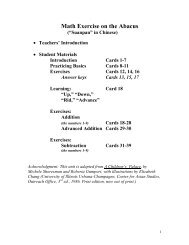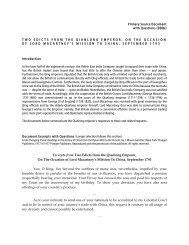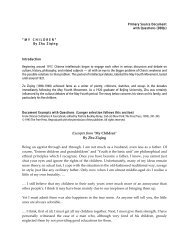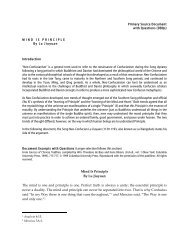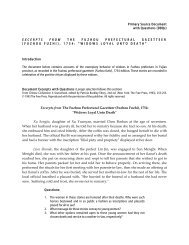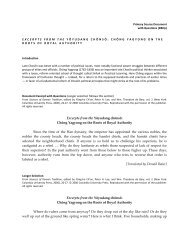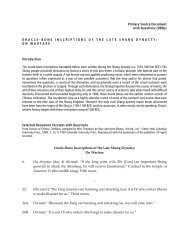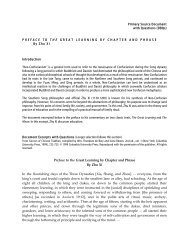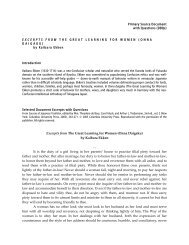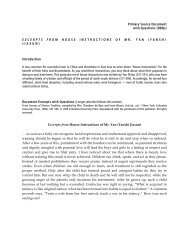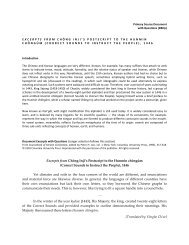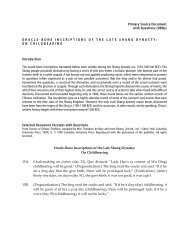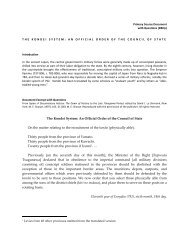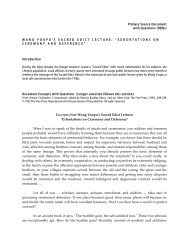Wang Yangming on the Unity of Knowing and Acting - Asia for ...
Wang Yangming on the Unity of Knowing and Acting - Asia for ...
Wang Yangming on the Unity of Knowing and Acting - Asia for ...
Create successful ePaper yourself
Turn your PDF publications into a flip-book with our unique Google optimized e-Paper software.
Prim ar y S our ce Doc um e ntwi t h Qu e st io n s ( D BQ s)W A N G Y A N G M I N G O N T H E U N I T Y O F K N O W I N G A N D A C T I N GInt rod uct io n“Neo-C<strong>on</strong>fucianism” is a general term used to refer to <strong>the</strong> renaissance <strong>of</strong> C<strong>on</strong>fucianism during <strong>the</strong> S<strong>on</strong>g dynastyfollowing a l<strong>on</strong>g period in which Buddhism <strong>and</strong> Daoism had dominated <strong>the</strong> philosophical world <strong>of</strong> <strong>the</strong> Chinese <strong>and</strong>also to <strong>the</strong> various philosophical schools <strong>of</strong> thought that developed as a result <strong>of</strong> that renaissance. Neo-C<strong>on</strong>fucianismhad its roots in <strong>the</strong> late Tang, came to maturity in <strong>the</strong> Nor<strong>the</strong>rn <strong>and</strong> Sou<strong>the</strong>rn S<strong>on</strong>g periods, <strong>and</strong> c<strong>on</strong>tinued todevelop in <strong>the</strong> Yuan, Ming, <strong>and</strong> Qing periods. As a whole, Neo-C<strong>on</strong>fucianism can best be understood as anintellectual reacti<strong>on</strong> to <strong>the</strong> challenges <strong>of</strong> Buddhist <strong>and</strong> Daoist philosophy in which avowedly C<strong>on</strong>fucian scholarsincorporated Buddhist <strong>and</strong> Daoist c<strong>on</strong>cepts in order to produce a more sophisticated new C<strong>on</strong>fucian metaphysics.As Neo-C<strong>on</strong>fucianism developed, two trends <strong>of</strong> thought emerged out <strong>of</strong> <strong>the</strong> Sou<strong>the</strong>rn S<strong>on</strong>g philosopher <strong>and</strong> <strong>of</strong>ficialZhu Xi’s syn<strong>the</strong>sis <strong>of</strong> <strong>the</strong> “learning <strong>of</strong> Principle” <strong>and</strong> <strong>the</strong> “learning <strong>of</strong> <strong>the</strong> Mind <strong>and</strong> Heart.” Both trends agreed that all<strong>the</strong> myriad things <strong>of</strong> <strong>the</strong> universe are manifestati<strong>on</strong>s <strong>of</strong> a single “Principle” (li) <strong>and</strong> that this Principle is <strong>the</strong> essence <strong>of</strong>morality. By underst<strong>and</strong>ing <strong>the</strong> Principle that underlies <strong>the</strong> universe (just as Buddhists understood all things in <strong>the</strong>universe as manifestati<strong>on</strong>s <strong>of</strong> <strong>the</strong> single Buddha spirit), <strong>the</strong>n, men may underst<strong>and</strong> <strong>the</strong> moral principles that <strong>the</strong>ymust put into practice in order to achieve an ordered family, good government, <strong>and</strong> peace under heaven. The twotrends <strong>of</strong> thought differed, however, <strong>on</strong> <strong>the</strong> way in which human beings are to underst<strong>and</strong> Principle.The thinking surrounding <strong>the</strong> “learning <strong>of</strong> <strong>the</strong> Mind <strong>and</strong> Heart” is most <strong>of</strong>ten identified with <strong>the</strong> Ming general <strong>and</strong>statesman <str<strong>on</strong>g>Wang</str<strong>on</strong>g> <str<strong>on</strong>g>Yangming</str<strong>on</strong>g> (1472-1529). <str<strong>on</strong>g>Wang</str<strong>on</strong>g> argued that inasmuch as every living thing is a manifestati<strong>on</strong> <strong>of</strong>Principle, <strong>the</strong>n <strong>on</strong>e need not look outside <strong>on</strong>eself in order to underst<strong>and</strong> Principle (<strong>and</strong> <strong>the</strong>re<strong>for</strong>e morality): <strong>on</strong>eshould c<strong>on</strong>sult <strong>on</strong>e’s own heart (or mind), wherein Principle surely lay. Since Principle is <strong>the</strong> basis <strong>of</strong> human nature,<strong>the</strong>n it follows that any<strong>on</strong>e who underst<strong>and</strong>s his or her true nature underst<strong>and</strong>s <strong>the</strong> Principle <strong>of</strong> <strong>the</strong> universe. In <strong>the</strong>short passage below Xu Ai, a student <strong>of</strong> <str<strong>on</strong>g>Wang</str<strong>on</strong>g> <str<strong>on</strong>g>Yangming</str<strong>on</strong>g>, relates <str<strong>on</strong>g>Wang</str<strong>on</strong>g>’s teaching regarding knowledge <strong>and</strong> acti<strong>on</strong>.Docu m e n t E xc erpt s w it h Q ue s tio n s (Complete document follows this secti<strong>on</strong>)From Sources <strong>of</strong> Chinese Traditi<strong>on</strong>, compiled by Wm. Theodore de Bary <strong>and</strong> Irene Bloom, 2nd ed., vol. 1 (New York: ColumbiaUniversity Press, 1999), 849-850. © 1999 Columbia University Press. Reproduced with <strong>the</strong> permissi<strong>on</strong> <strong>of</strong> <strong>the</strong> publisher. All rightsreserved.<str<strong>on</strong>g>Wang</str<strong>on</strong>g><str<strong>on</strong>g>Yangming</str<strong>on</strong>g><strong>on</strong><strong>the</strong><strong>Unity</strong><strong>of</strong><strong>Knowing</strong><strong>and</strong><strong>Acting</strong>TheTeachersaid,“…Therehaveneverbeenpeoplewhoknowbutd<strong>on</strong>otact.Thosewhoaresupposed to know but do not act simply do not yet know. When sages <strong>and</strong> worthies taughtpeople about knowing <strong>and</strong> acting, it was precisely because <strong>the</strong>y wanted <strong>the</strong>m to restore thisoriginalsubstance,<strong>and</strong>notjusttohave<strong>the</strong>mbehavelikethat<strong>and</strong>besatisfied.”
Prim ar y S our ce Doc um e nt , wit h Qu e st io n s (D B Q) o nW A N G Y A N G MIN G O N THE U NITY OF KN OW I N G A N D AC TIN GQ ue st io n s:1. Here <str<strong>on</strong>g>Wang</str<strong>on</strong>g> <str<strong>on</strong>g>Yangming</str<strong>on</strong>g> teaches that <strong>the</strong>re is no true knowledge withoutacti<strong>on</strong>. What would educati<strong>on</strong> look like if this principle were applied?2. How might a group <strong>of</strong> C<strong>on</strong>fucian scholars behave if <strong>the</strong>y were to take <str<strong>on</strong>g>Wang</str<strong>on</strong>g><str<strong>on</strong>g>Yangming</str<strong>on</strong>g>’s teaching seriously? What might <strong>the</strong> results be? Please thinkabout this both from <strong>the</strong> point <strong>of</strong> view <strong>of</strong> a member <strong>of</strong> such a group <strong>of</strong><strong>of</strong>ficials, <strong>and</strong> from <strong>the</strong> point <strong>of</strong> view <strong>of</strong> an emperor.Comp l et e Doc um e ntFrom Sources <strong>of</strong> Chinese Traditi<strong>on</strong>, compiled by Wm. Theodore de Bary <strong>and</strong> Irene Bloom, 2nd ed., vol. 1 (New York: ColumbiaUniversity Press, 1999), 849-850. © 1999 Columbia University Press. Reproduced with <strong>the</strong> permissi<strong>on</strong> <strong>of</strong> <strong>the</strong> publisher. All rightsreserved.<str<strong>on</strong>g>Wang</str<strong>on</strong>g><str<strong>on</strong>g>Yangming</str<strong>on</strong>g><strong>on</strong><strong>the</strong><strong>Unity</strong><strong>of</strong><strong>Knowing</strong><strong>and</strong><strong>Acting</strong>ThefollowingisrecordedinInstructi<strong>on</strong>s<strong>for</strong>PracticalLivingby<str<strong>on</strong>g>Wang</str<strong>on</strong>g>’sdiscipleXuAi.I [Xu Ai] did not underst<strong>and</strong> <strong>the</strong> Teacher’s doctrine <strong>of</strong> <strong>the</strong> unity <strong>of</strong> knowing <strong>and</strong> acting <strong>and</strong>debatedoveritback<strong>and</strong><strong>for</strong>thwithHuangZ<strong>on</strong>gxian<strong>and</strong>GuWeixianwithoutcomingtoanyc<strong>on</strong>clusi<strong>on</strong>.There<strong>for</strong>eItook<strong>the</strong>matterto<strong>the</strong>Teacher.TheTeachersaid,“Giveanexample<strong>and</strong>letmesee.”Isaid,“Forexample,<strong>the</strong>rearepeoplewhoknowthatparentsshouldbeservedwithfiliality<strong>and</strong>elderbro<strong>the</strong>rstreatedwithrespect,but<strong>the</strong>ycannotput<strong>the</strong>sethingsintopractice.Thisshowsthatknowing<strong>and</strong>actingareclearlytwodifferentthings.”TheTeachersaid,“Theknowing<strong>and</strong>actingyourefertoarealreadyseparatedbyselfishdesires<strong>and</strong>arenol<strong>on</strong>gerknowing<strong>and</strong>actingin<strong>the</strong>iroriginalsubstance.Therehaveneverbeenpeoplewhoknowbutd<strong>on</strong>otact.Thosewhoaresupposedtoknowbutd<strong>on</strong>otactsimplyd<strong>on</strong>otyetknow. When sages <strong>and</strong> worthies taught people about knowing <strong>and</strong> acting, it was preciselybecause<strong>the</strong>ywanted<strong>the</strong>mtorestorethisoriginalsubstance,<strong>and</strong>notjusttohave<strong>the</strong>mbehavelikethat<strong>and</strong>besatisfied.”As ia fo r E du cat ors | Colu m bia U niv ers it y | ht t p:/ /af e. ea s ia.colu m bia. e du Page 2 <strong>of</strong> 2



